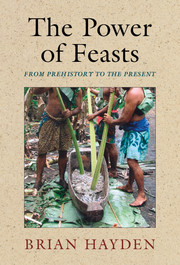Book contents
- Frontmatter
- Contents
- List of Figures
- Acknowledgments
- 1 Before the Feast
- 2 Food Sharing and the Primate Origins of Feasting
- 3 Simple Hunter/Gatherers
- 4 Transegalitarian Hunter/Gatherers
- 5 Domesticating Plants and Animals for Feasts
- 6 The Horticultural Explosion
- 7 Chiefs Up the Ante
- 8 Feasting in Early States and Empires
- 9 Industrial Feasting
- References Cited
- Index
8 - Feasting in Early States and Empires
Published online by Cambridge University Press: 05 October 2014
- Frontmatter
- Contents
- List of Figures
- Acknowledgments
- 1 Before the Feast
- 2 Food Sharing and the Primate Origins of Feasting
- 3 Simple Hunter/Gatherers
- 4 Transegalitarian Hunter/Gatherers
- 5 Domesticating Plants and Animals for Feasts
- 6 The Horticultural Explosion
- 7 Chiefs Up the Ante
- 8 Feasting in Early States and Empires
- 9 Industrial Feasting
- References Cited
- Index
Summary
When Inanna entered the Abzu,
He gave her butter cakes to eat.
He poured cold water for her to drink.
He offered her beer before the statue of the lion.
He treated her respectfully.
He greeted Inanna at the holy table, the table of heaven.
Enki and Inanna drank beer together.
They drank more beer together.
They drank more and more beer together.
With their bronze vessels filled to overflowing,
With the vessels of Urash, Mother of the Earth,
They toasted each other; they challenged each other.
– From Wolkstein and Kramer 1983:13–14With the emergence of early states, feasting takes on yet grander scales of consumption, sacrifices, pomp, and ceremony. Due to the emergence of writing in tandem with some early states, we also have the first written accounts of feasting from ancient times. In cases such as the Linear B inscriptions on Crete, these accounts are often simple records of the amount of beer, barley, sheep, goats, and other foods being requisitioned, or, in the case of the Shang oracle bones, the human sacrifices being made. However, they also include poetic descriptions of gods like Inanna and Enki having intimate feasts of beer and butter cakes that undoubtedly reflect similar feasts of the Sumerian elites. The early Shang verses also depict worshippers offering ancestors wine, soup, and the first fruits from the paddies:
Abundant is the year, with much millet, much rice. . .
We make wine, make sweet liquor, We offer it to ancestor, to ancestress,
We use it to fulfill all the rites, To bring down blessings upon each and all.
(Waley 1996:297)- Type
- Chapter
- Information
- The Power of FeastsFrom Prehistory to the Present, pp. 296 - 346Publisher: Cambridge University PressPrint publication year: 2014



